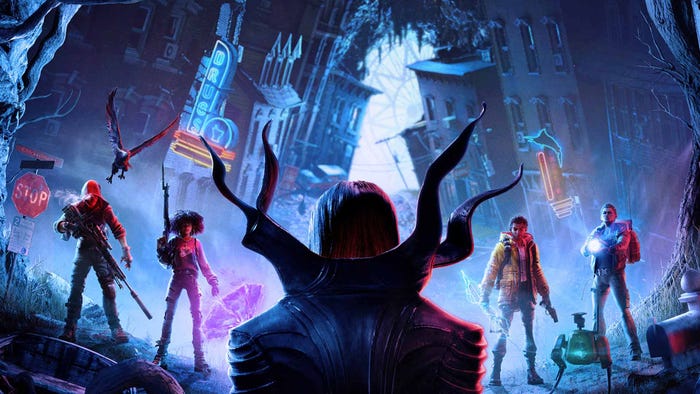Best of 2020: The trends and events that defined the year for game devs
2020 was a lot. We recapped the events and trends that shaped the game industry in this definitely-no-good-very-bad-year.
December 21, 2020

Author: by Bryant Francis, Alissa McAloon
The sun is setting on 2020, a year dominated by political upheaval, a once-in-a-century global pandemic, and no small amount of other front-page news events that kept us all glued to our phones night after night.
In the age of doomscrolling, the game industry churned on, buoyed by both unexpected success from the prevalence of lockdown orders across the globe and rocked by the same upheavals that impacted ordinary folks around the globe.
Here's a breakdown of the 10 trends and events that defined our industry this year. Maybe someday we'll learn some lessons from them.
The Fucking Pandemic
For better and for worse the global spread of COVID-19 reshaped the video game industry in ways that will be felt for years to come. Large studios suddenly developed robust remote work infrastructure. Physical events that shaped the year's marketing cycle were canceled. Developers of all stripes saw their daily average users spike upward, and multiple companies reported huge increases to revenue as lockdown orders cooped players indoors.
Some of those changes might sound positive. But the incredible stress on developers wrought by the pandemic cannot be overstated. We've heard heard story after story that while developers felt buoyed by new support for remote work, the pressure to ship high-level games in the midst of a global crisis created a new kinds of trauma.
This was particularly true for developers who are immunocompromised, taking care of children sent home from school, or otherwise impacted by the pandemic.
It really didn't have to be this bad. We didn't have to lose so many people. We didn't have to have a year of pain and isolation. We were forced into it by a lack of federal leadership and an insistence that the virus wasn't real or as deadly as it was. A crisis of indifference and cruelty has reshaped our industry in 2020. We would do right to celebrate the developers who adapted to it, but we also do well to remember this terrible year the next time politicians come around claiming that a crisis will just "magically go away."
Black Lives Matter
In 2020, the activists of the Black Lives Matter movement forced a major global reckoning over the violence inflicted on Black communities by police. The action they took was so great, it forced the politically gun-shy video game industry to voice its support for the movement at the highest level, and finally take some responsibility in its part for spreading systemic racism.
To cheer on the industry's reaction to Black Lives Matter in 2020 however is to damn its reaction to the movement which has been active since at least 2014. What finally pushed the industry over the edge? Was it the graphic video of police officer Derek Chauvin's murder of George Floyd? Was it a legion of police dressed like video game characters cracking down on protestors? Was it the sheer number of Americans risking their health and their lives to demand justice in the middle of a pandemic?
Whatever the reason, Black developers and activists who've been demanding more of the video game industry finally saw a response from various facets of the game industry, though that response ranged from empty posturing to actually helpful. Some companies offered mere words or tweets in support of BLM, while others promised actual investment into initiatives focused on Black creators.
Companies like EA and Activision put Black Lives Matter banners into their live games. Microsoft invested more effort into supporting Black content creators with the Xbox Series X launch. Twitch made promises to better prevent racist harassment on its platform by making changes focused on impact, not intent. Humble and Klei each put $1 million toward publishing Black game devs and Black charities, respectively.
It is an infinite contradiction to celebrate what steps the industry took while side-eying the indifference it had toward the BLM movement in years past. To resolve that contradiction, it is best to celebrate the developers and activists who made this moment happen. Whether it's the organizers of the Game Devs of Color expo, activists like I Need Diverse Games, or the rank-and-file developers of color inside companies who made change happen, it's their work that forced real change in 2020--though there's more work to be done.
Next Gen, Delayed
Can you believe that even as a global pandemic took off, Sony and Microsoft still somehow got the next generation of consoles on store shelves? Unfortunately, the next generation of games didn't necessarily arrive with them.
This isn't the first time that a console generation has shipped with some of its most notable games delayed a few months, but it is the first time that a new console's launch is mostly hinged on games that can be played on older generations. PlayStation's two launch exclusives are Marvel's Spider-Man: Miles Morales (a very robust expansion of Marvel's Spider-Man that can be played on PS4), and a remake of Demon's Souls. Other announced console exclusives like Horizon Forbidden West will also be playable on the PS4.
Microsoft's next-gen flagship title Halo Infinite was forced to delay a whole year after COVID-inflicted delays and executive changes impacted the game's production cycle. And the primary selling point for Xbox over PlayStation this year was Xbox Game Pass, a subscription service mostly built on the back of offering players convenient access to...a library of older Xbox games.
It's an unusual mix of COVID-induced delays, the existence of console refreshes like the PS4 Pro and Xbox One X, and a new, looser definition of "platforms" that creates a kind of fuzziness about this new generation. It is true that at some incoming point, new games won't be released on the Xbox One and PS4. But that cut is not as clean as in previous generations, and this autumn's console launch has been made all the stranger for it.
Make Mine Microsoft
Speaking of the big console makers, it's worth comparing and contrasting how each of them conducted themselves as the next console launch approached. Sony busied itself releasing a slate of commercially and critically successful games. Microsoft kept itself busy with a number of acquisitions and shutdowns that alter its business direction for the next generation.
The Redmond-based company continued its storm of game company acquisitions by picking up none other than Zenimax Media and the host of studios under its roof. Elsewhere, it shuttered its Twitch competitor Mixer. Both moves feel part of an aggressive series of decisions for the company that's trying to rewrite how its video game brand is perceived after course-correcting on the Xbox One launch.
The core business behind its game acquisition strategy remains a masterful move. Microsoft has made clear to investors that Xbox Game Pass subscribers are now one of its key indicators of financial success, and having more exclusive games it can place on the service will only make those numbers go up.
But the Mixer closure highlights some rough edges around the company's overall strategy. Its elimination came as a sudden surprise to employees and streamers alike, leaving an unusually foul mark on what's been an overall good year for Microsoft.
Accessibility Advancements Accelerate
The forward march of accessibility technology in video games continues. This year developers took up the banner of making their games more accommodating to players' unique needs, and the results were downright incredible.
The talented folks at Naughty Dog created an array of features that support deaf and blind players in The Last of Us Part 2, Obsidian went out of its way to support arachnophobes in Grounded, and even Geoff Keighley's video game marketing awards extravaganza offered audio narration on YouTube to support viewers in a way that hadn't been done before.
And those are just a few of the ways that accessibility features got a big push this year. None of this would have been possible without the incredible accessibility advocates at organizations like AbleGamers and Can I Play That, and the Game Accessibility Conference.
This is one trend we hope we get to write up repeatedly, thankfully until the point where it's no longer a trend, it's just how games are developed.
Fortnite vs The World
This year Epic Games took aim at what it calls anti-consumer practices from both major phone platforms and fired, kicking off a conversation and legal battle that stands to impact how both Apple and Google do business on mobile, though it looks like consoles may also end up in the crossfire.
The conflict started with Epic Games' showy attempt to dodge revenue splits on iOS and Android by adding its own payment method to Fortnite. Epic isn't shy about that fact; rather the company says what it did was make a statement on what it calls anti-competitive practices from mobile platforms, particularly Apple given the iOS-maker's traditionally tight hold on its platform.
Epic's argument is that folks like Apple should allow for a healthy amount of competition. That means allowing other vendors to launch their own app stores and payment processors, both steps that would allow developers and publishers to do business on iOS without forking over the standard 30 percent revenue share.
As a result of Epic's grand gesture, both Apple and Google removed Fortnite from their stores over the addition of that unsanctioned payment method, causing Epic to fire back mere moments later with lawsuits against each company. There's been a fair amount of back-and-forth since then: Apple called the whole affair a publicity stunt to reinvigorate Fortnite, Epic accused Apple of unjust retaliation when Unreal Engine's iOS support nearly became collateral damage, and Google argued it really shouldn't be included in the spat to begin with.
It'll likely be a while before this one wraps up. The whole affair kicked off in August, and trial isn't expected to begin until May 2021. We're already starting to see effects from the conflict trickle down to other game developers, at least on the surface. Apple did announce last month that it'll halve platform fees for smaller developers and publishers on iOS, seemingly addressing Epic's stance that its ultimate goal is to help the little guy enjoy the fruits of its labor though the move won't ultimately impact Apple's income that much.
And while console makers like Microsoft have publicly thrown their support behind Epic, there's the very likely chance that whatever decision is made in this case sets a precedent that could cross the platform line and impact how video game consoles conduct business as well.
Video Game Giants Zero In On Mobile
Mobile isn't untested waters by any means, but 2020 saw a renewed interest in the platform from a number of major industry players looking to take better advantage of an incredibly lucrative platform with massive reach. Both Electronic Arts and Activision Blizzard, for instance, took this year as strong indication that they aren't making the most of mobile.
Both EA CEO Andrew Wilson and Activision Blizzard president and COO Daniel Alegre separately called mobile their biggest opportunity for growth and an excellent way to reach new audiences with established IP.
Activision Blizzard was already big in the mobile space thanks to its ownership of Candy Crush maker King, but its more recent success with Call of Duty: Mobile has the company eyeing ways to bring all of its franchises to mobile down the line. In Alegre's words: “We need to make sure that we’re enabling our franchises on the billions of mobile devices that are available right now."
It's much of the same sort of thinking over at EA, though the company is taking a slightly different path towards its mobile future. New 2020 hire Jeff Karp is already hard at work revamping EA's mobile strategy; a Karp-led EA Mobile is now exploring licensing, co-development, co-publishing, and even studio acquisitions in order to find the right devs for mobile takes on its franchises and capitalize on that growth opportunity.
Of course this is only the tip of the mobile iceberg for 2020; analysts like Sensor Tower have estimated mobile spending to be up 21.7 percent in the US for the first 10 months of 2020, making it an attractive but highly competitive space for companies looking to expand the reach (and earnings) of their already established properties moving forward.
Toxic Studio Culture Cleanup
Misconduct allegations levied against a number of notable figures in the game industry set off an important conversation this year about workplace culture and how it can enable and protect abusers.
As more and more people came forward about their experiences, it became clear that many stories of harassment, sexual misconduct, and assault centered around staff at Assassin's Creed developer Ubisoft. In the wake of those first few allegations, Ubisoft issued a statement saying it was "deeply concerned" and was conducting its own investigations into each matter.
Meanwhile, horrific stories coming from current and former Ubisoft developers continued to emerge and suggested that the studio's culture and its leadership actively protected abusers and prioritize them over the needs of those on the receiving end of harassing and inappropriate behavior. Even the French company's investors commented on the string of allegations, with one particular investor asking Ubisoft CEO Yves Guillemot directly how abuse and misconduct could fester at the studio without his knowing.
Ubisoft has, for its part, reacted by announcing a string of initiatives aimed at investigating allegations, boosting diversity, and gathering meaningful info on the experiences of devs at Ubisoft. Several high-profile developers have departed the studio since those investigations began, signaling on some level that Ubisoft is receptive to change but both it and the industry as a whole still has a long way to go.
Flash is Dead, Long Live Flash
It's been a long time coming, but 2020 marks the end for Adobe Flash. December 31, 2020 to be exact. Adobe advised folks to abandon Flash a good five years ago over dwindling support and escalating security risks. Major browsers like Chrome, Edge, and Safari echoed those concerns by gradually winding down support up until a full discontinuation at the end of this year.
Many game developers have a particular soft spot for Flash, and rightly so. Flash offered an relatively accessible medium, both for developers and players. Early web games thrived on platforms like Kongregate that sprung up to house hundreds of games made with Flash, though it and other Flash game hubs have had to make recent pivots to shift toward the Flashless future.
Developers will continue to create challenging, thoughtful, and weird browser games long after Flash is gone. But any existing Flash games remaining on the web will be rendered unplayable once Flash goes dark, essentially erasing an entire chapter of game development history. That finality has, thankfully, caused several teams to pop up with the goal of preserving Flash games through methods like emulation and archiving to keep a generation of games alive.
Cyberpunk'd
Almost as if to prove 2020 still had time for one last catastrophe, Cyberpunk 2077's explosive launch at the end of December quickly took over the news cycle, and not for the reasons its creators were hoping. Things looked good for CD Projekt Red's latest right around release: CDPR boasted over 8 million preorders by launch and, a few days later announced that it had already earned back its marketing and development costs.
Launch, however, didn't go quite as smoothly as those early sales numbers. Once the game landed in players' hands, reports of crashes, bugs, and game performance that bordered on unplayable started to circulate. Early PlayStation 4 and Xbox One hardware fared the worst by far, prompting CD Projekt to issue an apology for the state of the game and urge players not willing to wait for stability patches to contact retailers for a refund.
Things escalated from there; Sony Interactive Entertainment was the first to announce that it would step outside of its usual rules for Cyberpunk 2077 and offer refunds to those that bought the game. SIE took things one step further and, for the first time in its history, pulled Cyberpunk 2077 from digital sale over the current state of the game.
Microsoft followed suit on the refund front (though the game is still up for sale), and CD Projekt Red later issued a separate statement saying it would work with players seeking refunds for their physical copies and issue refunds "our own pocket if necessary."
Separately CD Projekt admits it should've focused more on console performance and that the launch single handedly shredded the trust and reputation it'd built up with its fans over the last decade. This one is another that'll likely send shockwaves into 2021 and beyond, both as a team that's already endured a string of mandatory sees last-gen fixes move higher up on its to-do list and also as the fallout from the game's messy, high-profile launch is placed under a microscope by CD Projekt fans and investors.
You May Also Like











